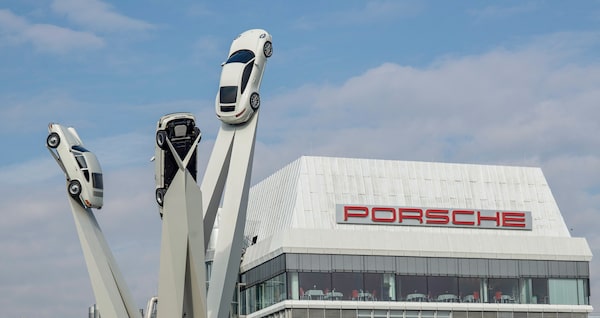
In this file photo taken on Feb. 21, 2019, the sculpture "Inspiration 911", showing three Porsche 911 sportscars from different generations is seen in front of the headquarters of luxury carmaker Porsche AG in Stuttgart, Germany.THOMAS KIENZLE/AFP/Getty Images
Volkswagen said it was considering hiving off its profitable Porsche division into a separate company with its own stock listing. The transaction would help the automaker raise money to invest in electric vehicles while also potentially returning more control of the high-performance carmaker to descendants of its founder.
Volkswagen preferred shares, the most widely traded, soared 9% Tuesday after the company said it had negotiated a “framework agreement” with Porsche Automobil Holding, the investment vehicle for descendants of Ferdinand Porsche, who founded the company in the 1930s.
The holding company, which owns 51% of Volkswagen’s voting shares, said in a statement that it might acquire shares in an independent Porsche carmaker as part of the transaction. If so, the family could trade shares in Volkswagen, one of the world’s largest carmakers, for a greater share of Porsche, which supplies a third of the parent company’s profits.
The transaction must be approved by Volkswagen’s supervisory board and could be vetoed by the state of Lower Saxony, which has two seats on the 20-person board, and Volkswagen workers, who have 10 seats. The transaction would generate cash that Volkswagen could use to manage a costly transition to electric vehicles, but it would also reduce the company’s share of Porsche’s profits. Volkswagen is likely to retain a stake in Porsche, although its exact size is not yet clear.
Stephan Weil, the prime minister of Lower Saxony and a member of Volkswagen’s supervisory board, said in a statement that he could not comment on the proposed deal.
A spinoff would be the latest chapter in an often fraught relationship between the Porsche family and Volkswagen. Ferdinand Porsche designed the Volkswagen Beetle for Adolf Hitler in the 1930s and oversaw construction of the enormous factory in Wolfsburg, in Northern Germany, that remains Volkswagen’s center of operations.
After World War II, Porsche’s son Ferdinand adapted Volkswagen components to create the first Porsche sports car. In the following decades, Volkswagen supplied parts to the sports carmaker and sometimes manufactured vehicles under the Porsche brand. For example, a Volkswagen factory in Slovakia made chassis and bodies for the popular Porsche Cayenne sports utility vehicles, which were finished at a Porsche factory in Germany.
Though the companies were closely intertwined, the Porsche family did not own a significant stake in Volkswagen. That began to change in 2005 when Porsche, flush with profits from the Cayenne, began using derivatives to gain control of Volkswagen shares.
Two top Porsche executives were later accused, but eventually acquitted, of stock market manipulation after the financial crisis in 2008 nearly torpedoed the takeover attempt. In 2009, over the objections of some shareholders who said the Porsche family was getting favorable treatment, Volkswagen agreed to acquire the Porsche car business. The deal left the Porsche family with a majority of Volkswagen’s voting shares and a quarter of the seats on the larger company’s supervisory board.
The proposed spinoff is another example of the family’s interests taking priority, said Ferdinand Dudenhöffer, director of the Center Automotive Research in Duisburg, Germany.
The family, Dudenhöffer said in an email, “are the winners and are securing their investment. Volkswagen, with its distorted governance system, is the loser.”
Both Porsche and Volkswagen have made a big push into electric vehicles. Porsche has done very well with its Taycan sports sedan, selling more of them than its flagship 911 and more than the combined 2021 sales of Tesla’s Model S and Model X.
Volkswagen and its luxury brand Audi have had more mixed results with their electric vehicles. The ID.3 and ID.4 have done well, but the Audi e-tron SUV has lagged comparable models from Tesla and other automakers. Sales have also been limited by a global shortage of computer chips.
Be smart with your money. Get the latest investing insights delivered right to your inbox three times a week, with the Globe Investor newsletter. Sign up today.